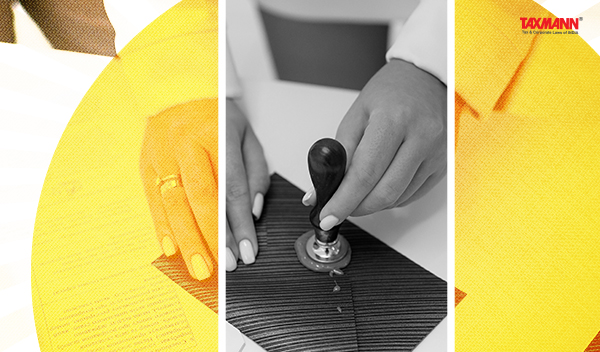Maximum Stamp Duty on AoA Alteration is a One-Time Measure, Refund Order for Subsequent Capital Increase to Be Upheld | SC
- News|Blog|Company Law|
- 2 Min Read
- By Taxmann
- |
- Last Updated on 11 April, 2024

Case Details: State of Maharashtra v. National Organic Chemical Industries Ltd. - [2024] 161 taxmann.com 324 (SC)
Judiciary and Counsel Details
- Sudhanshu Dhulia & Prasanna B. Varale, JJ.
Facts of the Case
In the instant case, an appeal was filed challenging the order of the Bombay High Court, whereby the High Court allowed the writ petition of the respondent company.
The Respondent Company was incorporated with an initial share capital of Rs.36 crores. In the year 1992, the respondent company increased its share capital to Rs.600 crores and accordingly paid a stamp duty of Rs.1.12 crores as per Article 10 of Schedule-I of the Bombay Stamp Act, 1958.
Thereafter, the appellant amended Article 10 and introduced a maximum cap of Rs.25 lakhs on the stamp duty which would be payable by a company. Subsequently, the respondent company passed a resolution for a further increase in its share capital to Rs.1200 crores and paid Rs.25 lakhs as stamp duty.
However, according to the respondent company, this was done inadvertently as it was soon realized that the stamp duty was not liable to be paid by them since the maximum stamp duty which was Rs.25 lakhs, had already been paid by them in the year 1992.
Consequently, the respondent company wrote a letter to the appellant seeking a refund of the payment of stamp duty of Rs.25 lakhs. However, this request was turned down by the appellant on the ground that since an increase in share capital materially alters the character of the instrument i.e. Article of Association, it requires a fresh stamp according to its altered character and needs to be charged as a separate instrument.
The Writ Court directed the appellant to refund stamp duty. Aggrieved by the order of the Writ Court, the respondent company filed a writ petition before the Bombay High Court challenging the aforesaid order and seeking a refund of stamp duty of Rs 25 lakhs along with an interest.
The High Court allowed the writ petition and directed the appellants to refund the stamp duty of Rs 25 lakhs along with an interest @6% p.a. to the respondent company. Thereafter, an appeal was made to the Supreme Court.
Supreme Court Held
The Supreme Court observed that the maximum cap of Rs.25 lakhs would be applicable as a one-time measure and not on each subsequent increase in the share capital of the company was fortified directly by the Maharashtra Stamp (Amendment) Act, 2015 which amended the charging section for Article of Association i.e., Article 10 of the Stamp Act.
Further, it is true that the amendment does not have a retrospective effect, however since the instrument, i.e. Article of Association remains the same and an increase was initiated by the respondent after the cap was introduced, duty already paid on the same very instrument would have to be considered.
The Supreme Court held that it was not a fresh instrument which had been brought to be stamped, but only the increase in share capital in the original document, which had been specifically made chargeable by the legislation.
Therefore, the order of the High Court was to be upheld. Accordingly, the appellant was directed to refund Rs.25 lakhs paid by the respondent along with an interest.
Disclaimer: The content/information published on the website is only for general information of the user and shall not be construed as legal advice. While the Taxmann has exercised reasonable efforts to ensure the veracity of information/content published, Taxmann shall be under no liability in any manner whatsoever for incorrect information, if any.



 CA | CS | CMA
CA | CS | CMA
